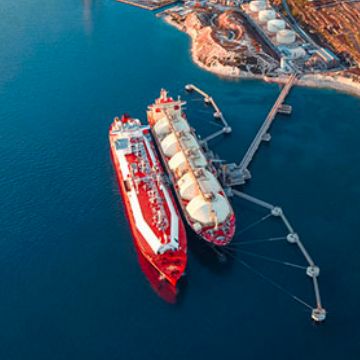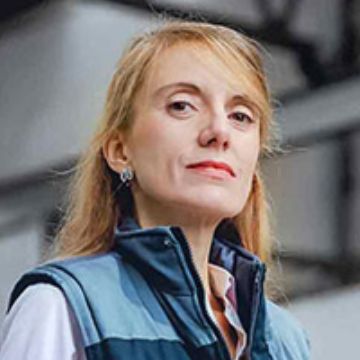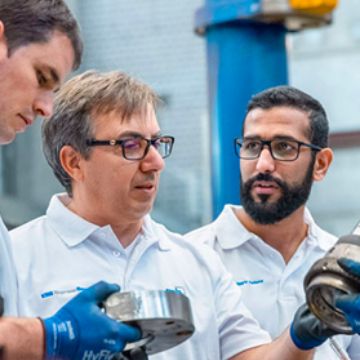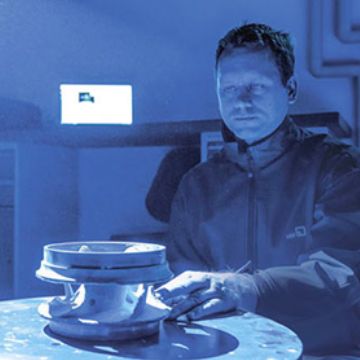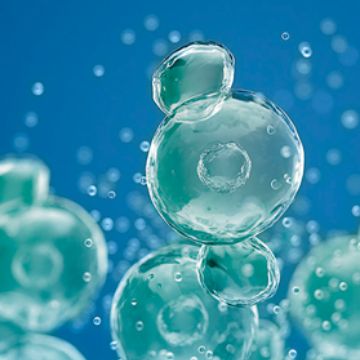- DE
- Annual Report 2022
- www.ksb.com

Acting responsibly
KSB has set itself nine binding sustainability goals which the company aims to achieve by 2025 at the latest. One of these goals is to reduce greenhouse gas emissions at production sites worldwide.
Sustainability lies at the core of KSB’s corporate strategy. This includes the responsible use of resources and the environment as well as the company’s responsibility to employees and corporate social commitment.
The 17 Sustainable Development Goals (SDGs) set out by the United Nations express the central challenges and guiding principles of a global sustainability policy. They aim to preserve natural resources by ensuring that development remains sustainable. As a global company, KSB influences economic, ecological and social developments.
Setting ambitious goals
KSB supports the 17 Sustainable Development Goals set out by the United Nations. 2019 saw the company develop its own nine global sustainability goals based on the UN initiative. KSB aims to achieve them by 2025 at the latest. The nine goals address issues in the areas of the environment, employees, social matters and supply chain sustainability. The focus is on climate protection, the promotion of decent working conditions and sustainable economic growth, and health and well-being. In addition, KSB is committed to doing even more to promote gender equality. The company also intends to gather more comprehensive information on how suppliers deal with sustainability issues. KSB is dedicated to combating poverty and hunger as well as to ensuring the availability of clean water and education through social projects. Developing the knowledge of employees is another binding target.
The nine KSB sustainability goals for 2025
One of the most important goals of the United Nations calls for action on climate protection. KSB is part of the drive for sustainable change and is engaged in concrete measures to combat climate change and its effects. The company intends to reduce CO2 emissions in its manufacturing plants by 30 percent worldwide by 2025 at the latest, based on the corresponding figure for 2018.
Measures undertaken to achieve this goal include reducing energy consumption and switching to green electricity.
Numerous measures implemented worldwide
KSB’s second largest location in Germany, the manufacturing plant in Pegnitz, has been using green electricity from renewable sources exclusively since the beginning of 2022. “This saves more than 5,000 tonnes of carbon dioxide annually,” says Pegnitz Site Manager Harald Hofmann. “More and more ustomers are interested in how our products are manufactured and the environmental footprint we leave behind.” Other production sites within the Group have also made the switch to green electricity, and more are to follow.
 Solar panels on the roof of KSB’s factory in Concorezzo, Italy
Solar panels on the roof of KSB’s factory in Concorezzo, ItalySome of the Group’s locations have even gone one step further and are already climate-neutral. In Italy, for example, KSB was awarded the Zero Emission certificate. Located near Milan, the company’s plant in Concorezzo does not produce any carbon dioxide. “A few years ago, we started to take a close look at the energy data of all the buildings at our plant,” says Oscar Bellotto, who oversees sustainability-related issues at the site. This was followed by concrete measures such as the use of photovoltaic systems to generate electricity and solar collectors to provide hot water. “In addition, 100 percent of our electricity comes from renewable energy,” explains Bellotto.
In India, KSB operates a green factory in Shirwal. The planners of the manufacturing facility for high-efficiency power plant pumps, which opened in 2017, designed all of the buildings to consume as little energy as possible. The production halls, for instance, are designed to make the most of the natural light available so that employees do not need artificial lighting at all for at least eight hours a day. The buildings also feature environmentally friendly and energy-saving air-conditioning systems. They work solely via evaporation and require no refrigerant.
In Shirwal, KSB uses its own solar plants to generate much of the energy it needs. Cutting-edge machinery and systems meet the highest efficiency standards and consume as little electricity as possible.

It is part of our corporate social responsibility to reduce greenhouse gas emissions.
Seeing the big picture: Oscar Bellotto is responsible for sustainability issues at KSB in Italy.
Green investments at headquarters
At its Group headquarters in Frankenthal, KSB is also driving forward a number of climate protection measures and reducing its carbon footprint. For example, a new heating system is currently being built at the pump and valve manufacturer’s largest location at a cost of around 15 million euros. Thanks to a more efficient plant design and a higher proportion of renewable heat from biomass, the new facility will save around 3,700,000 kilowatt hours per year – or 900 tonnes of CO2 – compared with the previous heating system.
The new IT headquarters in Frankenthal built in 2022 also meet the latest energy requirements. Around 100 people work in these 3,000-square-metre premises. The air heat exchangers installed and the photovoltaic elements on the roof meet almost all of the building’s energy needs.
For KSB, the goals for 2025 are only an intermediate step. The company will keep striving to make every aspect of its business activities sustainable, and play its part in securing an ecologically sound future for the world.
Sustainability at KSB
Power consumption
Share of renewable energy in the Group’s electricity consumption in 2022; in Europe this was 82.2 %.
Greenhouse gases
Reduction in carbon dioxide emissions in 2022 compared with the previous year
Social commitment
89Social initiatives and projects supported by KSB in 2022

